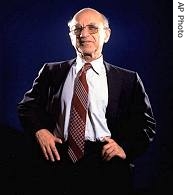2006年VOA标准英语-Nobel Laureate Friedman Dies at 94(在线收听)
By Paul Francuch
Chicago
16 November 2006
Professor Milton Friedman, hailed by some as perhaps the 20th century's greatest champion of capitalism and economic freedom, is dead at the age of 94.
 Dr. Milton Friedman, 1976 Nobel Prize winner for economics, poses for a photo in 1977 |
||
Born in New York to poor Jewish parents, Friedman displayed brilliance in mathematics at a young age, winning a scholarship to Rutgers University in neighboring New Jersey. Intrigued by the field of economics, Friedman went on to do graduate work at the University of Chicago, the home of some of the nation's leading conservative economists of the time.
While at Chicago, he married fellow graduate student Rose Director. Following World War II, Friedman earned his doctorate at Columbia University, then returned to Chicago as a faculty member.
While championing the cause of the free marketplace, Friedman faced much opposition from his fellow economists who believed in the teachings of liberal British economist John Maynard Keynes. The United States government under President Franklin Roosevelt spent its way out of the great depression of the 1930s, following the theories of Keynes. Needless to say, Keynes's theories enjoyed remarkable popularity.
Yet Professor Friedman and his followers at the Chicago school attacked Keynes' sanctioning of government intrusion in the free market. Friedman argued that inflation caused by the government's printing of more money distorts the economy, eventually leading to its collapse, thereby creating an even bigger role for the state in the private lives of its citizens.
He said individualism and freedom of enterprise were the preferable alternatives.
"A free market and maintaining a free market, under conditions where the market is not distorted, is by all odds the most useful role a government can play in economic life," said Friedman. "But this requires that government be relatively small. When government imposes taxes, when it buys things, spends money, it distorts the terms on which people can trade with one another."
"The most obvious example is in foreign trade," he added, "our government, most of the governments around the world impose restrictions on foreign trade. They impose tariffs, or quotas, or subsidize exports."
"All such restrictions, all such impositions, interfere with the effective operation of the market, prevent people who could benefit jointly from trading with one another from doing so. So I go back: the most useful role government can play is to stay out of the details of the market, but establish an effective framework for a free market," he said.
Friedman argued that a free market encompasses much more than just economic concerns.
"A free market includes the free exchange of views, the ability to read what people write, regardless of what their views are, the whole area of freedom of speech, of religion, of discussion, of the press, is really an aspect of a free market," he said. "It is an area in which individuals should be free to cooperate with one another, to exchange views, to say what they believe."
Friedman began teaching his laissez faire economic theories at a time when many in his profession scorned such ideas. That is not the case today.
Milton Friedman's students include some of the best and the brightest. He served as an economic advisor to several presidents, and his ideas are bound to influence economists and economic policy for many years to come.